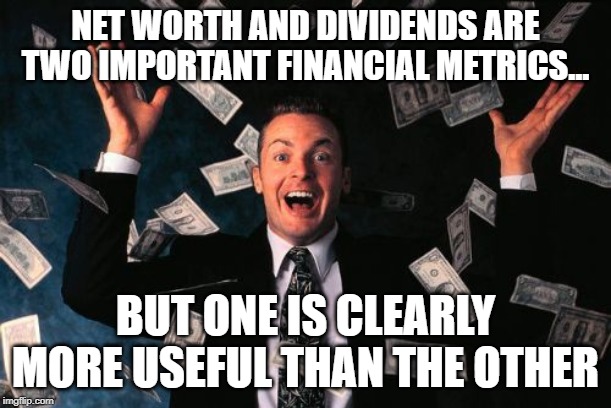
Image Source: imgflip
The Practicality of Using Net Worth to Measure Financial Success
Don't get me wrong. Although I prefer tracking dividends and place more emphasis on that, I certainly see the value in also tracking net worth. Net worth is a fantastic measure of your financial success because you can only become financially independent on a sufficient asset base. There are downsides to net worth if you don't properly track it and you include everything in the number.
I prefer to only include assets that generate an income for me. While your car may help you get to work so you can make money, chances are it probably won't generate an income for you. The same concept applies to a house.
The other notable drawback to using net worth to measure your financial success is that depending upon your asset allocation, your net worth may be highly volatile and subject to market downturns.
Without also measuring the dividends that one is receiving, one may be discouraged whenever the next bear market hits and their stock holdings are down 30, 40, or even 50%.
For those that are index fund investors, market downturns are actually even more discouraging because due to the low yield of index funds, this means that any downturn in the market forces retirees to sell off their index funds at the worst time to make up the difference between the cost of their lifestyle and the amount of dividends they collect from their index funds.
Why Using Dividend Income To Measure Financial Success Is Ideal
As they the personal finance mantra goes, cash is king. More specifically, ample cash flow to cover one's expenses renders one financially independent.
One of the many great things about dividend income is that regardless of what the market does, as long as one is diversified into great companies across most sectors of the economy, the cash flow will continue to increase right through a recessionary period.
While equating one's net worth with financial success can be a recipe for disappointment in a bear market, using dividend income to measure financial success can be a factor for motivation or comfort. If an investor is a retiree, they can sleep well at night knowing their stock holdings continue to generate an ever increasing amount of dividends. If an investor is still working, they can view the decline in their net worth as an opportunity to buy dividend stocks at very appealing valuations.
Conclusion:
I view both net worth and dividend income as very important metrics to track. Without an ample net worth, one can't become financially independent. After all, $100,000 can only generate so much in dividends for an investor without sacrificing a good bit of dividend safety and growth. But at the same time, when that $100,000 seemingly evaporates to $50,000 in the midst of a bear market, investors can take solace in knowing that their dividend income is largely independent of market volatility, which can actually help them take advantage of the market turmoil.
Discussion:
Do you measure your net worth? How about your dividend income? Do you see the case for tracking both, but placing more emphasis on dividend income than net worth? As always, thanks for reading and I look forward to replying to your comments.
Hey Kody. I like the topic.
ReplyDeleteI track both my dividend income and my net worth. I'd say I probably focus more on my net worth, mainly because I don't think my dividend income will ever cover 100% of my future expenses. I'll most likely need to begin liquidating my assets in order to live at today's level once I quit working.
If I could reach retirement and have the dividends cover my expenses, then I think I'd focus on the dividends more.
ED,
ReplyDeleteThanks for the comment. That's a great point. If one is going to need to rely on their net worth to cover excess expenses that their dividends can't, net worth is going to be quite important.